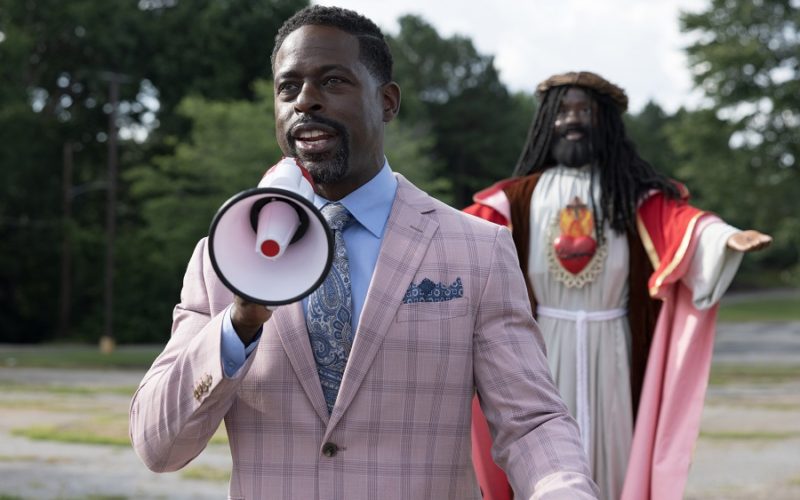Honk for Jesus, Save Your Soul (Ebo, 2022)
Honk for Jesus, Save Your Soul is being marketed as a “satirical comedy,” so the starting point of any honest review has to be that I didn’t laugh once.
That in itself may not be disqualifying. Differences in taste or experience could lead some people to find a film funny that another does not. The more damning critique is that I honestly could not tell when I was supposed to laugh. Was it when Pastor Lee Curtis Childs (Sterling K. Brown) is confronted by the young man he sexually abused and flinches as he fears the younger man will hit him? Is it when his wife, Trinitie (Regina Hall) dons white face make up so that her street mime routine might attract more parishioners? Is it when the pastor proves impotent when asked to actually look at his wife during sex?
The excesses of mega-rich pastors is ground well trod for satire, both Horatian (gentle satire directed toward a like-minded audience) and Juvenalian (biting satire holding up the objects for scorn and derision). In either case, humor would seemingly be based on the incongruity between the preaching and the practice. But as is the case with the marginally more successful drama The Eyes of Tammy Faye, this film solicits pathos more than scorn by showing its characters on the brink of epiphany. The problem, and it is one that Honk for Jesus never solves, is that self-awareness in this context would lead to shame and guilt and so must be shut down and avoided at all costs.
For that reason, the film is actually hurt by how good Brown and Hall are as actors. Scene after scene is shot and blocked to empathize reaction shots, and the talent skillfully convey recognition of emotions that cannot, must not, be articulated, even if confession is the only potential road to transformation. (It doesn’t help that the pastor’s homosexual desire is the core source of shame that cannot be acknowledged as this again invites sympathy from a contemporary audience rather than laughter.) But even the sympathetic audience must grow weary when the same scenario is just endlessly repeated…there is a disconnect between the methodology and the message. Repetition can be a valid structure for comedy, but it is a less successful structure for tragedy, because such a structure refuses transformation or change, giving the audience very little opportunity for catharsis.
In Atlas of the Heart, Brené Brown attempts to differentiate between Shame, Guilt, Humiliation, and Embarrassment (132-133). The person feeling shame says “I am bad,” while the person feeling guilt says “I did something bad.” She claims that the person who feels shame believes himself deserving of scorn and condemnation while the person who is humiliated believes he is not deserving of such abuse. Finally, the person feeling embarrassed may acknowledge their discomfort, but not to a degree that threatens his sense of belonging. One’s error is common enough or minor enough to not threaten one’s identity.
To use Brown’s lexicon, embarrassment is about something like farting in a public elevator, not being outed before your congregation as a serial pedophile and sexual abuser. And it is precisely because embarrassing situations do not seriously threaten our self-esteem that we can laugh at them when we are in them or take some amusement in them when they happen to others without feeling as though we are being cruel. Comedy, in other words, is the land of embarrassment, but Honk For Jesus is a detailed map of the land of shame and guilt — the least funny emotions there are.
I mentioned that a good portion of Honk for Jesus is built around the scandal caused by the pastor’s homosexual (or bisexual?) behavior…behavior that is presented as shameful and humiliating. It’s not clear to me how well the film understands that inviting us to laugh (if it does) at the pastor’s shame would be cruel, while inviting us to pity or sympathize with the pastor’s humiliation is to endorse a worldview (he doesn’t deserve it) that he proves himself incapable of feeling, sharing, or extending to others.
Any time comedy cuts across ethnic or racial divides, it is possible that the person who doesn’t get it (in this case, me) will be met with claims that he is blind to the humor because he is not familiar with the culture that it depicts. I certainly acknowledge that there is a difference between jokes that don’t land and jokes that go over my head. I’m skeptical, but I allow for the possibility that there is humor here that I am incapable of seeing because of my own cultural blind spots. But even that is a critique of sorts. There are plenty of films about other cultures that are able to communicate humor, pathos, or both in such a way as to allow the audience member to recognize the core human emotions or experiences that transcend cultural divides.
Here, the core, universal experiences that I recognize are, again, shame, guilt, pain, and humiliation. These are the least funny emotions I can think of. They are the experiences I am least likely to find pleasure in remembering or recognizing and least apt to laugh at when artfully or skillfully depicted in and by another.

